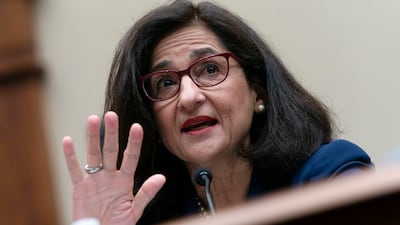Columbia University president Minouche Shafik announced on Wednesday her intention to resign, effective immediately.
In a statement to the New York-based university community, she said the protests that rocked the campus this year, along with others worldwide, had been factors in her decision.
“This period has taken a considerable toll on my family, as it has for others in the community,” Ms Shafik wrote.
“Over the summer, I’ve been able to reflect and have decided that my moving on this point would best enable Columbia to traverse the challenges ahead.”
Ms Shafik was appointed president of the university last year as the first woman to take on the role.
Born in Alexandria, she and her family left Egypt when Gamal Abdel Nasser began nationalising the country.
She grew up in the southern US, living in Georgia, Florida and North Carolina. She holds British and US citizenship.
Previously, she led the London School of Economics, where she earned her master's degree before attaining her doctorate at the University of Oxford.
She also worked at the World Bank, where she rose through the ranks to become the bank’s youngest vice president, as well as the UK Department for International Development, and stints at the International Monetary Fund and the Bank of England.
At the time of Ms Shafik’s appointment, Columbia board of trustees chairman Jonathan Lavine described her as a leader who deeply understood “the academy and the world beyond it”.
“What set Minouche apart as a candidate,” Mr Lavine had said in a statement, “is her unshakable confidence in the vital role institutions of higher education can and must play in solving the world’s most complex problems.”
Columbia was the site of a large student-led protest – one of many across the country – against the war in Gaza and Washington's support of Israel.
Ms Shafik condemned what she called anti-Semitic language and intimidating and harassing behaviour on the campus by protesters, and asked police to intervene when demonstrators refused to disperse.

